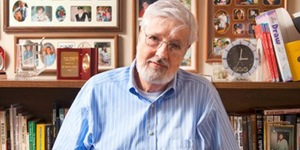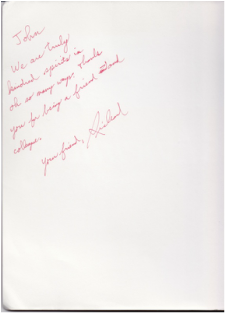|
It was, once again, a wonderful experience to be lucky enough to attend my third ADI Annual Conference, this one was held in Budapest, Hungary. Even nicer was that my two brothers accompanied me on the trip. We hadn't all traveled together since we were still kids basically and haven't seen each other near as much as I would prefer since both of our parents passed away. My wife and I had just spent about a week with my brothers and their spouses in March in Florida where one lives year around and the other has a vacation home so that was wonderful as well. Something that hopefully will happen with more regularity while I still have some quality of life left. But I digress as usual, if you have read much of my blogs, you will know this is situation normal for me these days.
ADI2016 was wonderful to see old friends, meet people in person that I felt like I knew well because of our online Zoom meetings for DAI, but in reality, had never met in person and meet lots of new people. For the third year in a row, DAI had a booth at the conference and I ended up at the booth a large amount of the time but was able to see a few key presentations like one by my colleague and DAI Chair Kate Swaffer, a key presentation by Peter Mittler concerning DAI's work on human rights issues for people with dementia and a wonderful presentation by DAI member Mary Radnofsky. I gave a "plenary" speech during the opening ceremonies for the inaugural Richard Taylor Lecture to honor the late Dr Richard Taylor who passed away in July of 2016 of cancer. Richard was a founding member of DAI and a great friend. Richard was truly a hero to so many of us that live with a dementia diagnosis because he, unlike me, was a dynamic speaker and also was a world class self-advocate which is just to say that he advocated for dementia related issues and had a dementia diagnosis. When being proper with English, we say we self-advocate because we live with the condition that we advocate for but frankly, I don't always make that distinction. It is one of pure semantics and not all that important in total scope of things in my view. So I was incredibly disappointed in myself with the job I did with my speech. There were many that congratulated me and said it was great but I know it wasn't and the biggest reason it wasn't is simple and clear to me. My type of frontal variant Alzheimer's started in the frontal lobe in what was described to me like the junction box for all brain function which is why all my initial symptoms had to do with executive function like multitasking, time management, staying on task, etc. Well now days (nearly nine years after diagnosis) I have some memory involvement as well and while still fairly minor comparatively, it gets scary when you add in new symptoms. So, when I contemplated 30 minutes or more of speaking time, it seemed like an eternity to fill and I researched, re-read things that Richard had written to me, things he had written to others and his book "Alzheimer's from the Inside Out" which was probably the first really big seller (for that type of book) that was written by someone living with dementia, probably of the Alzheimer's type. Then I wrote, re-wrote and then re-wrote again a speech while typing it in to the "speaker's notes" in my PowerPoint presentation which also included a 4 minute video of Richard speaking because I felt nothing less would do justice. Well I forgot one crucial element in the whole process and I felt so stupid when I began that speech because it fully occurred to me that I had NEVER actually timed how long of a speech I wrote and that got in my head and really gave me a bad case of nerves. Now I have spoken totally off the cuff to large groups before then but since being diagnosed and have never been very nervous about it, so this was new for me. It led to stumbling around many, many times through the information when I realized that I had far, far more speech than was realistic and then trying to edit on the fly. It was my worst nightmare. And I had placed SO MUCH importance in my own mind on this speech that it just made the feelings of nervousness almost unbearable. If you happen to have been one of the audience that evening, I apologize for what I consider really doing an injustice to the subject as I left out so many points that were extremely important to me to include. The speech I gave was not how I wanted it to go and I felt completely embarrassed by the job I did with it. I did learn one thing, I won't ever do another presentation without knowing exactly how long it takes to convey all the main points of what I want to convey. Gone are the days when I could always speak off the cuff on anything and be fine. I still don't like having a totally "canned" speech but it will have to be so much more planned in the future right down to timing and of course I have the problem of going off the rails so to speak if I don't have notes to keep me there so I know that is a necessity. The problem in Hungary was once I had to try to edit on the fly, I was hopelessly lost among at least 10 pages with notes more than I had time to cover and nerves would not allow me to re-cover. NOT a good situation if I didn't have dementia, but with dementia it was too much for me to recover from, this ship felt like it was sinking fast. People have told me that I am just being too critical of myself but I know it wasn't good, I know it was far from what I had planned, but once things seem to go off track with for me, it is REALLY hard to turn it all around and on this night seemingly impossible. So it would seem that I upset myself far more than anyone else, although it is hard to tell because people don't want to hurt your feelings. And I know if Richard was here, he would be telling me to let it go, so now it's time for me to actually let it go and just do better next time. I will never be a speaker of the quality that Richard was in his years after diagnosis, he had spent 20 years lecturing to college students and twice been voted teacher of the year so that incredible talent was in long term memory for Richard. I spent a career of speaking to one, two or maybe five people at a time while selling business to business and that always went more like a conversation where listening was more important than speaking. It was frankly a miracle to me the first time I spoke to a large group that I wasn't nervous, it seemed as if the disease had removed that burden. Well at least until Budapest. And add on to all of it the emotions involved that we had lost a great friend and mentor, and it was just too much for me to handle on this night. I could see my friend Kate become emotional which only added fuel to the fire and made concentration too much to ask, I just felt like I needed to get off the stage with my life instead of feeling gratified that I had paid substantial homage to our friend or even fairly describe DAI of which he helped create. So overall the conference was once again a great experience, the speech was a "painful" experience but I have to remember, I'm letting that one go now. I also want to mention that a booth near us was one that belonged to a group named WYLD or World Young Leaders on Dementia and they were such a breath of fresh air. They are our future in the dementia field and it was awesome to meet some of these incredibly bright young people! I think it was a spectacular idea whoever started this organization to connect these great young people to network together around the world. I would like to give a shout out to Rebekah Churchyard with whom my brother and I had breakfast with one morning when she invited us to sit at her table, I had met her the previous day when she was working at their booth. She is a shining example of what these young people are all about and it gives me renewed hope about our young professionals. Be sure to visit DAI's site by clicking here and read the blog page to catch up with what is going on as well as lots of other content on the site, check it out. We always offer FREE membership to anyone with a dementia diagnosis and welcome all others to connect with us by subscribing to our mailing list and subscribing to our blog.
1 Comment
|
AuthorSee Home of my site to learn more about me. Archives
May 2016
Categories |


 RSS Feed
RSS Feed
